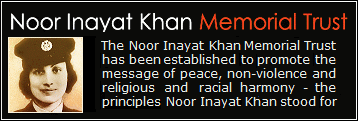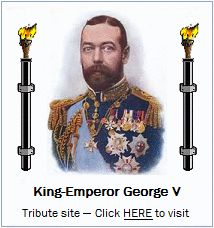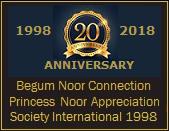



|
The birth of Violette Reine Elizabeth Bushell Szabo took place on 26 June 1921.
Her mother was French, her father an Englishman, who had met his wife while
serving in the first world war.
She was a popular girl, showing signs of courage at a very early age. When the second world war began, Violette met a Captain in the French Foreign Legion, Etienne Szabo. Within a few weeks, on the 21st August 1940 they were married. Etienne was posted abroad, Violette saw nothing of him for a year. He returned for seven days furlough, they met in Liverpool and spent his holiday together. Violette became pregnant, it was the last time she saw him alive. He was killed in North Africa. Time passed, her daughter Tania was born. Violette received a letter from a Mr E Potter asking her to to attend an interview at an office in London. When she arrived at the office, she was shown up to a bare room with a table and two chairs. Mr Potter suggested that her knowledge of France and fluency in French could be useful. He explained that he was looking for people to do 'dangerous work' in occupied France. "You mean spying?" she asked. 'No, not spying - but similar', he said. 'We want people with special qualities to be trained and go into enemy occupied territory to make life very unpleasant for the Germans'. She agreed immediately, but Mr Potter would not accept that, he wanted to run security investigation on her and he wanted her to give it some serious thought. She returned a week later and again gave him the same answer. Then began her training. Violette went into France twice. 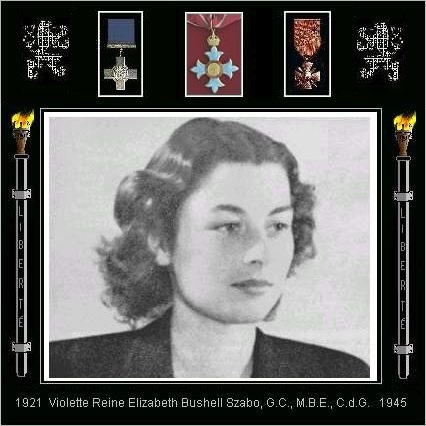 Madame Szabo volunteered for a particularly dangerous mission in France during April 1944, when she acted as a courier to a Frenchman who had survived the break-up of his circuit based on Rouen and was trying to reconstitute a group in this strategically important area. She had to travel from Paris to Rouen, contacting certain people believed to have remained unmolested and report back to her chief in Paris. She accomplished this dangerous task successfully and after about 6 weeks returned to England. On D-Day plus one, 7 June 1944, she was dropped into France again and soon afterwards, with her guide, a young Frenchman, was ambushed by a German patrol and wounded. She insisted that her guide should escape while he could, and she herself was captured and taken first to Limoges and then to Paris. After brutal interrogations over several weeks when she divulged nothing, she was put on a train for Germany.On the journey while an air raid was in progress and the guards ran for shelter, she managed, despite being chained by the ankle to another prisoner, to carry a bottle of water to badly wounded British officers in a cattle truck. Imprisonment at Ravensbrück Concentration Camp followed and then two spells in labour camps, working under impossible conditions. Between 25 January and 5 February 1945, Madame Szabo was returned to Ravensbrück and executed. Madame Szabo's award of the George Cross was published in the London Gazette on 17 December 1946. Madame Szabo was also awarded the Croix de Guerre (France). Her husband, Lieutenant Etienne Szabo (Free French Forces), was killed in action at El Alamein on 24 October 1942. Violette Szabo is commemorated on the Brookwood Memorial  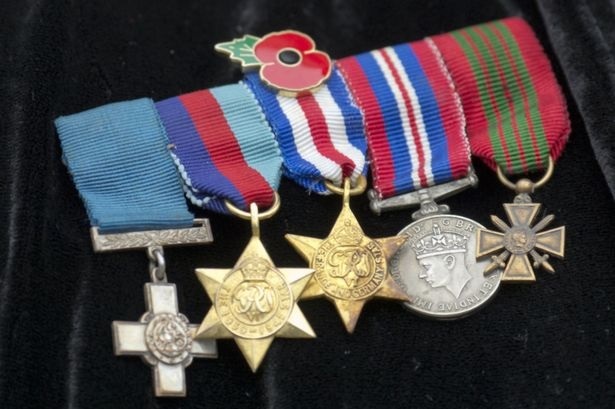 20 July 2015 Gallantry medals won by a British secret agent in World War Two should be bought for the country, the founder of a museum set up in her name has said. Violette Szabo was captured days after the D-Day landings and later killed. A Special Operations Executive (SOE) agent, her story was turned into a 1958 film Carve Her Name with Pride starring Virginia McKenna. The medals, currently on display at the Violette Szabo museum in Herefordshire, are being auctioned on Wednesday. The five medals, including a posthumously awarded George Cross and French Croix De Guerre, are expected to raise up to £300,000. Rosemary Rigby, who founded the museum at Szabo's childhood holiday home at Wormelow, said they deserved to stay in the UK. She was born in Paris in 1921 to an English father and French mother and moved to England with her family. At the outbreak of war she joined the land army, but enlisted with the SOE after the death of her French husband in 1942. Speaking fluent French she was trained as a field agent to work alongside the Resistance. In 1944, she was captured trying to disrupt the German response to the D-Day landings and was later shot at Ravensbruck concentration camp at the age of 23. She is one of only four women to be awarded the George Cross, since its establishment in 1940. She said the medals had been "so hard won" and it was important they stayed on display in the country "she fought and died for". Miss Rigby said she hoped a private benefactor would come forward. She said it had been a "terrible shock" to learn of the secret agent's daughter Tania Szabo's intention to sell the medals, but she understood the move. From: www.bbc.com UPDATE: 22 July 2015 A George Cross posthumously awarded to a British spy tortured and executed by the Nazis was sold today for a world-record £312,000. The bravery medal along with four others belonging to Violette Szabo, who worked for the Special Operations Executive in occupied France, was auctioned for £260,000 within a minute of going on sale in London's Mayfair. They were bought on behalf of Lord Ashcroft and will go on display at the Imperial War Museum two miles away in Lambeth. Auctioneers Dix Noonan Web said the sale price for the collection - which reached £312,000 including commission - meant a record price had been paid for a George Cross, surpassing the previous highest total of £93,000. From: www.dailymail.co.uk |
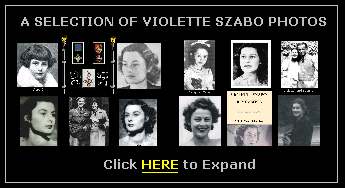

 _
_


